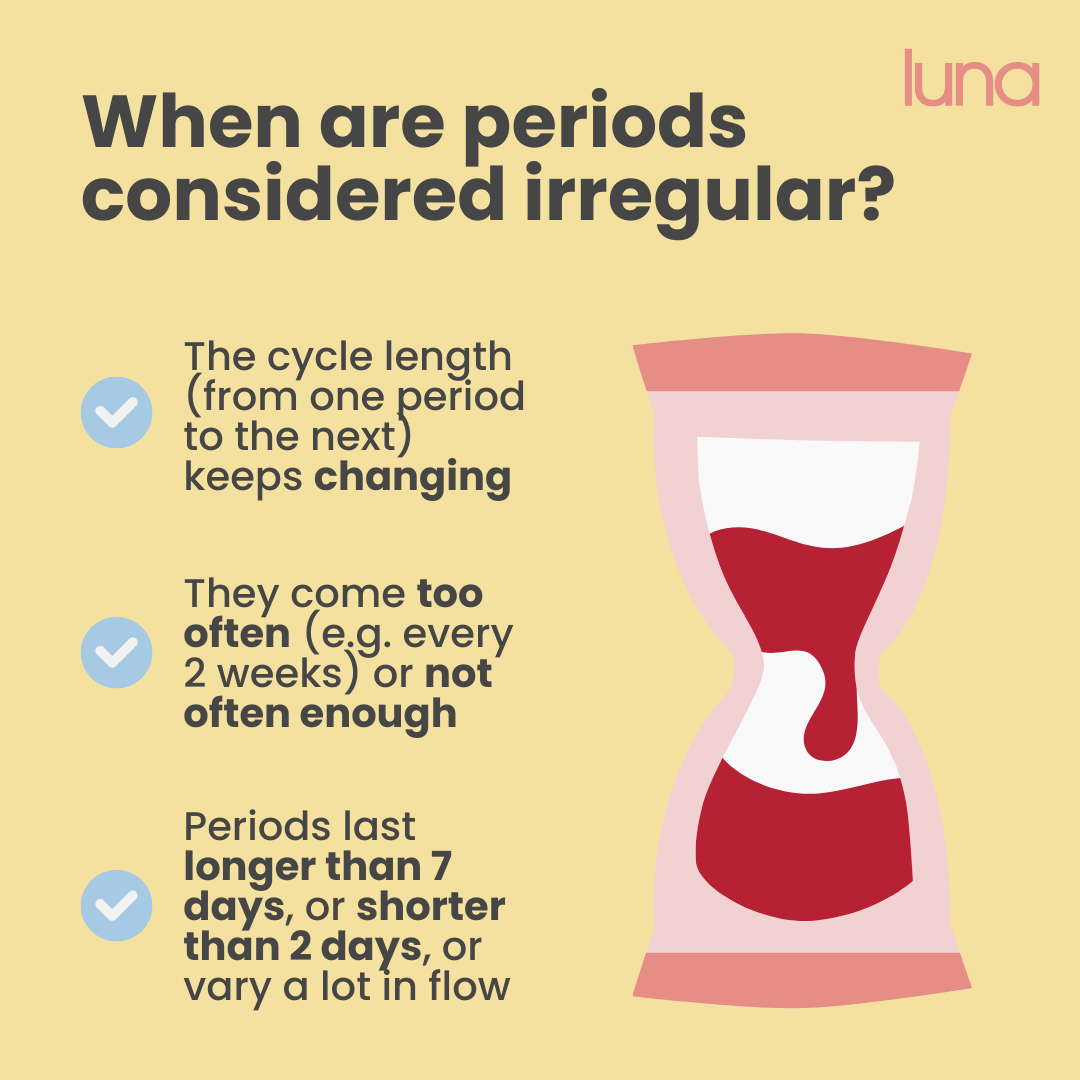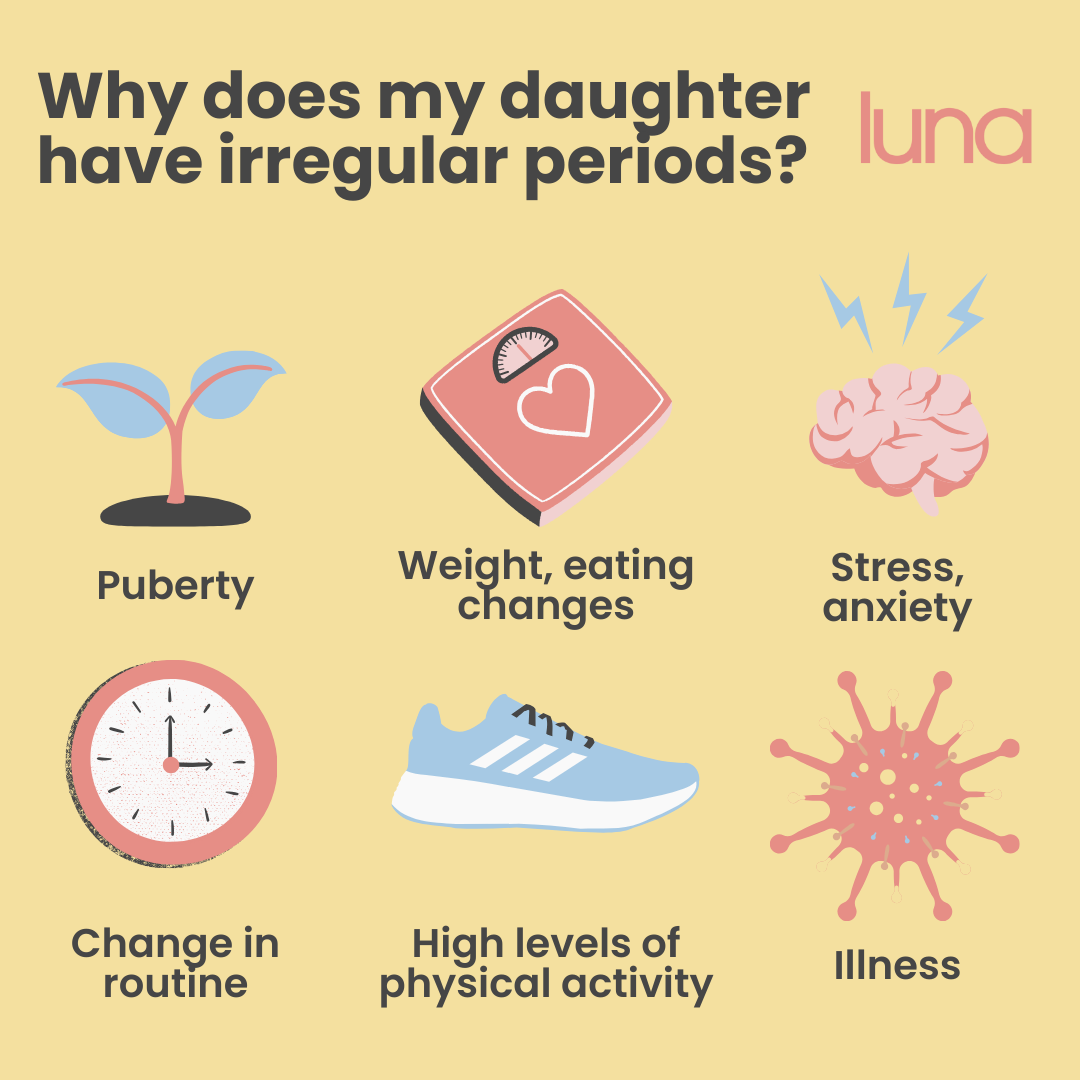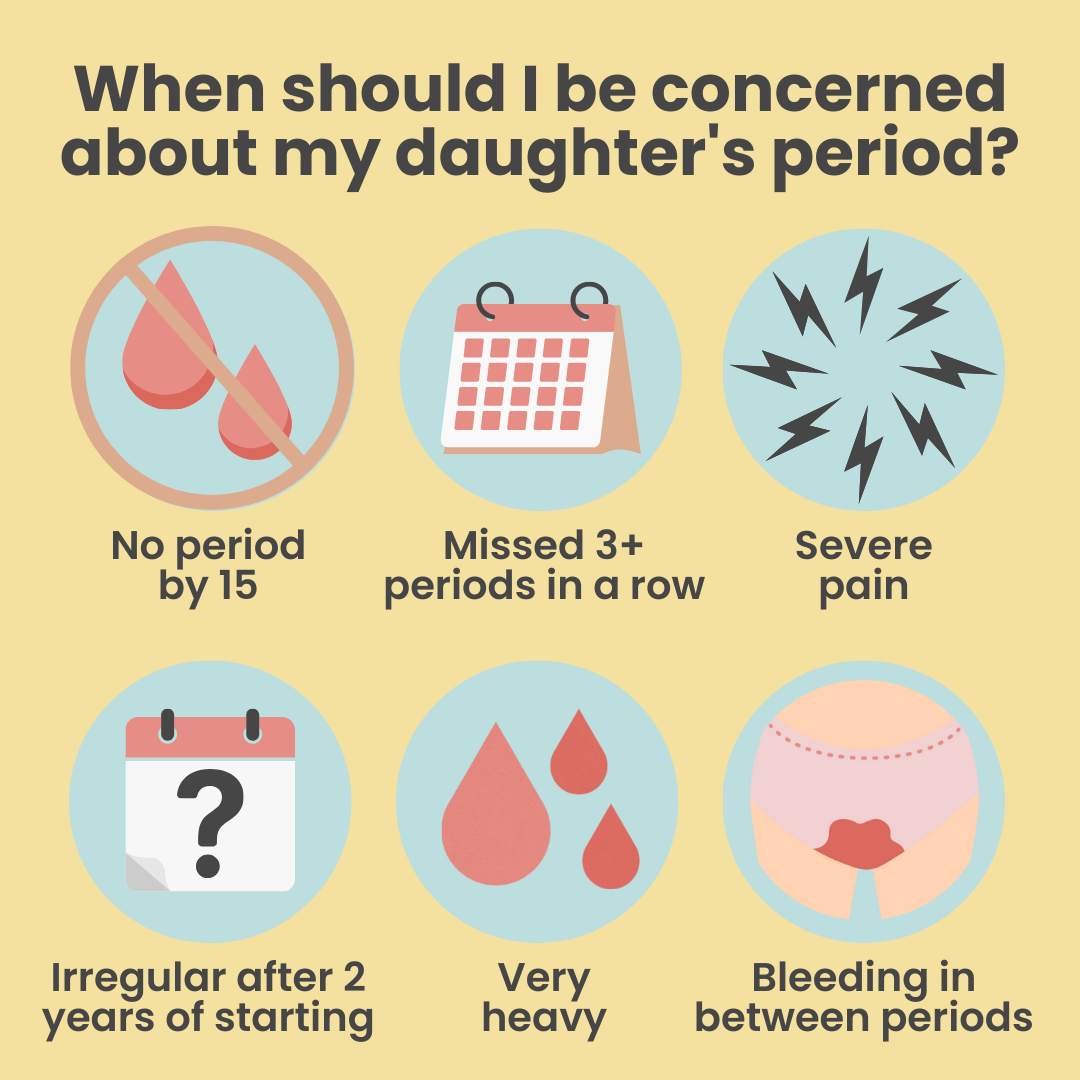Is it normal for teens to have irregular periods?
A parent’s guide to irregular and late periods in teenage girls

Updated January 16, 2026 • Medically reviewed by Dr. Emma Dickie
Medically reviewed by Dr. Emma DickieIn this article
- Is it normal for teens to have irregular periods?
- What are irregular periods?
- What is considered a normal ?
- What counts as irregular periods in teens?
- What are the signs a period is coming?
- Why does my daughter have irregular periods?
- When should I be concerned about my daughter's period?
- Are there any effects of irregular periods on the body?
- How to cure irregular periods in teenage girl?
- So, are irregular periods normal for teens?
- FAQs about irregular periods in teens
Is it normal for teens to have irregular periods?
Research shows that around 41% of girls report irregular menstrual cycles, with younger teens more likely to be affected than older teens.
Only 13% of girls polled on the luna app claimed their periods were regular immediately.
In the first few years after periods begin (usually between ages 9 and 14), irregular cycles are very common and often nothing to worry about.

What are irregular periods?
Irregular periods mean menstrual cycles that don’t follow a consistent pattern.
This can include periods that come too often or not often enough, cycles that vary in length from month to month, missed periods, or bleeding that is unusually heavy, light, long, or short.
What is considered a normal menstrual cycle?
A typical menstrual cycle lasts between 21 and 35 days, counted from the first day of one period to the first day of the next.
Periods themselves usually last 2 to 7 days.
During puberty, it’s normal for these ranges to vary, especially in the first 1-2 years after a first period.
What counts as irregular periods in teens?
A “regular” period doesn’t mean it arrives on the same date every month.
Menstrual cycles are measured from the first day of one period to the first day of the next, and dates often shift because months are different lengths.
Periods may be considered irregular if a teen experiences any of the following:
- Cycle lengths that change significantly from month to month
- Periods that come very frequently (for example, every 2 weeks) or very infrequently (you may want to read up on stop and start periods)
- Periods that regularly last less than 2 days or longer than 7 days
- Bleeding that is very light one month and very heavy the next
- Missed periods or long gaps between periods
What matters most is consistency.
If a period pattern is very different from what your teen usually experiences, it may be considered irregular.
In the first 1-2 years after a first period, some irregularity is expected as hormones settle.
What are the signs a period is coming?
Even when periods are irregular, some teens notice signs that a period is approaching.
These can include lower back pain, bloating, breast tenderness, headaches, changes in mood, or acne.
It can also be helpful to help your teen understand the signs a period is ending, if they tend to vary in length each time.

Why does my daughter have irregular periods?
The menstrual cycle is controlled by hormones.
During puberty, these hormones are still developing and learning to work together, which can make periods unpredictable for a while.
Common reasons teens experience irregular or late periods include:
- Puberty: it can take around 1-2 years after a first period for cycles to become more regular
- Stress or anxiety: emotional stress can delay ovulation and affect the timing of periods
- Weight changes or restrictive eating: losing or gaining weight quickly can disrupt hormone levels
- High levels of physical activity: especially in sports like gymnastics, dance, swimming, or endurance training
- Illness or changes in routine: being unwell, poor sleep, or travel can temporarily affect cycles
These causes are very common in teenage girls and are usually temporary. In many cases, periods become more regular as the body matures.

When should I be concerned about my daughter's period?
While irregular periods are common during puberty, there are times when it’s important to seek medical advice.
You should consider speaking to a doctor if any of the following apply:
- Your teen has not started their period by age 15
- They have missed three or more periods in a row
- Their periods are still very irregular more than two years after their first
- Periods regularly last longer than 7 days or less than 2 days
- Bleeding is very heavy (for example, needing to change a pad or tampon every 1-2 hours for several hours, or passing large clots that exceed the size of a 10p coin)
- They experience severe pain, dizziness, fainting, or extreme tiredness during periods
- There is bleeding between periods
A doctor can assess whether further tests are needed and help rule out any underlying conditions.
If your teen is sexually active and has missed a period, pregnancy should always be ruled out by a healthcare professional.
Seeking medical advice doesn’t mean something is wrong – it’s often simply a way to get reassurance and support.
What might a doctor check or recommend?
If a doctor needs to investigate irregular periods, they may ask about menstrual history, overall health, diet, exercise, and stress levels.
In some cases, blood tests or other checks may be recommended to look at hormone levels.
Treatment depends on the cause and may include reassurance, lifestyle advice, or medication if needed.
In some cases, a doctor may discuss hormonal options if appropriate, depending on age, symptoms, and underlying cause.

Are there any effects of irregular periods on the body?
Irregular periods on their own are not usually harmful, especially during the teenage years.
For many teens, irregular cycles are simply part of the body adjusting to hormonal changes after puberty.
However, if periods remain very irregular for several years or are accompanied by other symptoms, they can sometimes be a sign of an underlying issue.
These may include:
- Polycystic ovary syndrome (PCOS)
- Thyroid conditions
- Hormonal imbalances
- Disordered eating or undernutrition
These conditions are not diagnosed based on irregular periods alone.
A doctor would consider other symptoms, medical history, and – if needed – blood tests or scans.
Keeping track of periods and any other symptoms using luna can make it easier to notice patterns and share clear information with a healthcare professional.

How to cure irregular periods in teenage girl?
There isn’t a single cure for irregular periods in teenage girls, especially during puberty.
In many cases, especially during puberty, irregular periods do not need medical treatment and improve on their own over time.
However, supporting overall health can help the menstrual cycle become more regular over time.
Here are some ways parents can help support more regular periods:
- Encourage regular, balanced meals
Skipping meals or restrictive eating can disrupt hormone levels and delay periods. - Support stress management
Stress and anxiety can affect the hormones involved in the menstrual cycle. Relaxation, routine, and emotional support can help. - Promote balanced physical activity
Exercise is healthy, but very intense training without enough rest or nutrition can contribute to irregular or missed periods. - Prioritise good sleep habits
Hormones are regulated during sleep, and poor sleep can affect cycle regularity. - Track periods and symptoms
Keeping track of cycle length, missed periods, and symptoms can help identify patterns and decide when medical advice is needed.
If periods remain very irregular, stop altogether, or are affecting your teen’s health or wellbeing, a doctor can assess whether further support or treatment is needed.
So, are irregular periods normal for teens?
Irregular periods are usually part of growing up – especially in the first few years after starting menstruation.
But if your daughter is missing periods for long stretches, bleeding heavily, or feeling unwell, it’s always okay to speak to a doctor.
Tracking patterns on luna and keeping communication open can make a big difference in helping them feel supported and confident about their body.

FAQs about irregular periods in teens
How long do irregular periods last in teenagers?
Irregular periods are most common in the first 1-2 years after a first period.
For many teens, cycles gradually become more regular as hormones settle.
Some variation can still be normal later in adolescence.
Can stress cause irregular periods in teens?
Yes. Stress can affect the hormones that control ovulation and the menstrual cycle.
Emotional stress, anxiety, or major changes in routine can all contribute to late or missed periods.
Is it normal to have irregular periods years after puberty?
Occasional irregularity can still be normal, but periods that remain very irregular several years after puberty may need medical assessment to rule out underlying causes.
When should I take my daughter to the doctor about her periods?
It’s a good idea to see a doctor if periods are missed for several months in a row, are very heavy or painful, or remain irregular more than two years after a first period.
Is it normal for a 12-year-old to have irregular periods?
Yes. Irregular periods are very common in 12-year-olds, especially in the first year or two after a first period.
At this stage, the body is still adjusting to hormonal changes, and cycles may be unpredictable or spaced far apart.
It’s common for periods to be missed for a few months early on, and this usually settles over time.
Is it normal for a 13-year-old to have irregular periods?
Yes. Irregular periods are very common in 13-year-olds, especially in the first year or two after a first period.
At this stage, the body is still adjusting to hormonal changes, and cycles may be unpredictable or spaced far apart.
It’s common for periods to be missed for a few months early on, and this usually settles over time.
Is it normal for a 14-year-old to have irregular periods?
Yes. Many 14-year-olds still experience irregular periods, particularly if they started menstruating in the last 1-2 years. Cycles may vary in length, and some months may be missed.
As long as periods are not very heavy, prolonged, or causing significant symptoms, this is usually normal during puberty.
My 15 year old daughter has irregular periods
It can be normal for a 15-year-old to have irregular periods, especially if their first period was later or within the past two years.
However, cycles often begin to settle by this age.
If periods remain very irregular beyond two years of having periods, they miss 3 in a row, or they're accompanied by heavy bleeding or other symptoms, it may be worth speaking to a doctor.
Is it normal to have irregular periods at 16?
By age 16, many teens have more regular menstrual cycles. Occasional variation is still normal, but ongoing irregular periods beyond two years of starting periods may need further assessment.
If a teen is missing periods for 3 months in a row or experiencing worrying changes in their periods, a healthcare professional can help determine whether any tests or support are needed.
How we created this article:
luna's team of experts comprises GPs, Dermatologists, Safeguarding Leads and Junior Doctors as well as Medical Students with specialised interests in paediatric care, mental health and gynaecology. All articles are created by experts, and reviewed by a member of luna's senior review team.
Sources:
NHS "Irregular periods" | Accessed 12.12.25
https://www.nhs.uk/conditions/irregular-periods/Kids Health "Irregular periods" | Accessed 12.12.25
https://kidshealth.org/en/teens/irregular-periods.htmlNHS "Missed or late periods" | Accessed 12.12.25
https://www.nhs.uk/conditions/missed-or-late-periods/Patrícia Marques, Tiago Madeira, Augusta Gama "Menstrual cycle among adolescents: girls’ awareness and influence of age at menarche and overweight" | Accessed 12.12.25
https://pmc.ncbi.nlm.nih.gov/articles/PMC8734600/We'd love to keep in touch!
Sign up to our parent newsletter for emails on the latest teen trends, insights into our luna community and to keep up to date
By signing up, you are agreeing that we can use your email address to market to you. You can unsubscribe from marketing emails at any time by using the link in our emails. For more information, please review our privacy statement.